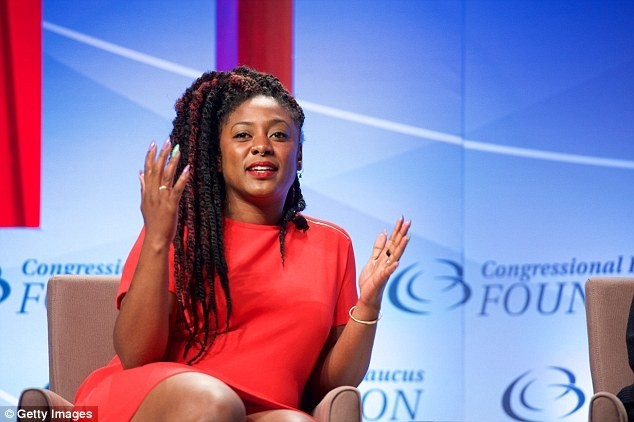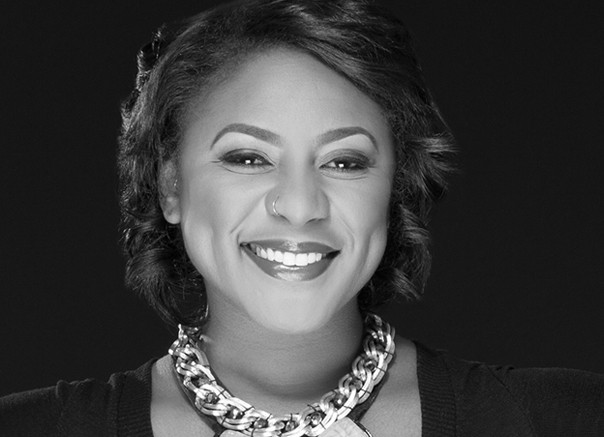On the evening of Jan. 21, nearly 100 people filled the Hughes-Trigg Ballroom to hear Alicia Garza, cofounder of #BlackLivesMatter, speak about the movement, current social injustice and hopeful plans for the future.

Garza, an activist and writer from Oakland, California, created #BlackLivesMatter with her non-related sisters Opal Tometi and Patrisse Cullors as a “call to action” toward the black community after the death of Trayvon Martin and the announcement that George Zimmerman was acquitted. Garza also said #BlackLivesMatter was founded as a response to anti-black racism that is still occurring today.
After a short introduction and thunderous welcoming applause, Garza took center stage with a smile on her face. She began her speech with a short greeting, “Hey, how y’all doing?” before diving into the #BlackLivesMatter movement, where it came from, what it is and why it exists.
“I think the way I want to start is [by saying] hashtags don’t start movements, people do,” Garza said.
She elaborated by talking about the background of the #BlackLivesMatter hashtag that went viral on Facebook, Instagram and Twitter.
“Hashtags are a way for people to join a conversation,” Garza said. “What we are experiencing, participating in today didn’t start from the three words on social media…this is a movement that has been bubbling under the surface for a very long time.”
Garza then revealed that the #BlackLivesMatter movement didn’t just start on social media; in fact, the whole purpose and reason for it even being prompted was because “we have an epidemic of black death in this country.”

From the death of Matthew Johnson in 1967 to Trayvon Martin in 2013, before then and even now, Garza reiterated that this epidemic persists in the U.S decades after the legal liberation of the race.
She credits this anti-black sentiment as something deeply rooted in the country.
“The DNA of this country renders black bodies as worthless,” Garza said. “Sure we can play football, basketball, sing and entertain- but we are not worthy to walk the street. We become suspicious; we become a suspect…Black people are even seen as three-fifths human in the founding documents of this country- only used for votes.”
Because of this black history, Garza chose to write an open love letter on Facebook for black people in 2013, after the verdict of the Trayvon Martin case, at a time where “we were shown no love,” that shortly went viral and eventually became #BlackLivesMatter.
Garza said that #BlackLivesMatter is a love letter for black people to call to action and demand equality so that all people can love equally, have families of their own, live to old age and celebrate milestones.
The cofounder emphasized that #BlackLivesMatter is not solely focused on one specific race.
“When we say ‘black lives matter’ it doesn’t mean your life doesn’t matter– it means we want our lives to matter too,” Garza said. “If we want to live in a world that is equal, then we have to fight like hell to make that happen.”
When mentioning protesting and fighting for equality, Garza made another clarification that is often misconstrued: #BlackLivesMatter is not anti-police.
“We are not anti-police– we are against being killed against the state for no reason, we are against not having transparency…we are not anti-police, but we are anti-death, anti-murder and anti-genocide,” Garza said.
She began closing her speech by urging other to join the movement, helping in any way they can.
“Have compassion, but couple that with being unapologetic,” Garza said. “Pay attention to the culture we create. We truly do value freedom for everyone, so the cultures we create cannot be about hating people, cause we have been hated on.”
Garza began to digress, saying, “love is more powerful all the time” and that “none of us are free until all of us are free.”
She concluded her speech asking audience members, who have supportively snapped, praised and clapped throughout the hour seminar, to internally evaluate themselves and see if they, too,ca can be activists in #BlackLivesMatter.
“None of us are free until all of us are free; imagine what our world could look like in our lifetime…let’s send shockwaves through the country,” Garza said. “It’s already here– it’s our duty…the choice is ours. Thank you.”
#BlackLivesMatter is an international network of 30 chapters of black people inter-generationally who organize in their local communities to ensure that black lives do matter. For more information, visit BlackLivesMatter.com.









